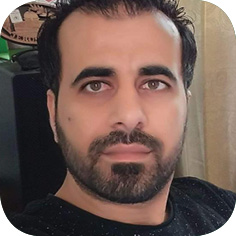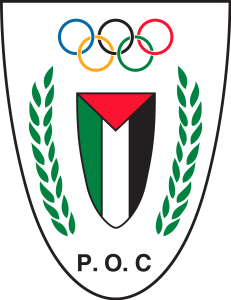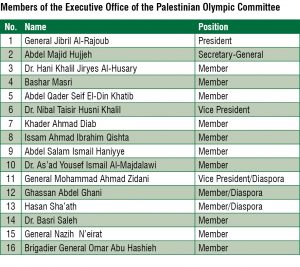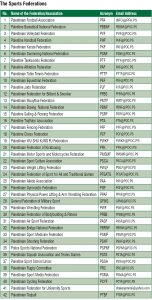Translated by Elias Khayyo
The Palestinian National Olympic Committee (PNOC) is a national nongovernmental organization with independent legal status, which has no political, religious, or commercial attributes. It was established and recognized for the first time by the International Olympic Committee in 1934 during the Athens session, then it was forced to cease its activities due to the British Mandate, followed by the Israeli occupation of Palestine, until it was recognized again, officially, in session 101 (in Monaco) on September 18, 1993, in accordance with the Olympic Charter. The PNOC is endorsed by the International Olympic Committee, registered with the Ministry of Interior, and licensed by the Higher Council of Youth and Sports in accordance with national laws. It is a member of the International Olympic Committee, the Olympic Council of Asia, the Union of Arab National Olympic Committees, and the Islamic Solidarity Sports Federation.
The committee is composed of unions of Olympic, international, and specialized sports, with the aim of regulating and sponsoring sports activities in Palestine within the framework of public policy made by the state and the Higher Council of Youth and Sports, and the programs and plans approved by the Olympic Committee and the concerned sports unions. The PNOC aims to spread, develop, regulate, and protect sports, and to prepare Palestinians based on Olympic values, principles, and ethics, in addition to the role it is vested with and is expected to perform in the journey of national liberation and innovation.
About 42 sports unions (groups, individuals, and specialized sports) fall under the umbrella of the Palestinian Olympic Committee nationally, including Olympic, global, and international sports.
The PNOC joined the Olympic Council of Asia in 1986, and has participated in its meetings since 1984. It took part in the Asian Games, which took place in Bangkok – Thailand (1998); Busan – South Korea (2002); XV Asiad in Doha – Qatar (2006); Guangzhou – China (2010); and Incheon – South Korea (2014).
The PNOC is a founding member of the Union of Arab National Olympic Committees and has participated in all Arab games and ceremonies.
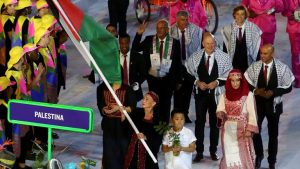
Vision
To have Palestinian athletes who have a sense of national belonging and Olympic culture and are skillful and capable of competing internationally.
Message
Consolidate national and Olympic values and principles in Palestinian society in all places where it is present via the development of the awareness and capabilities of Palestinian athletes and enable them within the framework of a legal environment to attain innovative Palestinian athletes who are partners in sustainable development and are capable of competing in the Arab, continental, and international arenas, culminating with the Olympics.
Goals
• Spread sports opportunities among Palestinians and expand the base of sportspersons.
• Establish active and advanced Palestinian sports that are protected nationally and committed to Olympics.
• Ensure regularity of sports tournaments and international competitions.
Mission
Spread, develop, and protect Palestinian sports at home and in the diaspora, and elevate the proficiency of sports unions and their constituents, including public and administrative bodies, work teams, players, and technical staff, through domestic and overseas programs and activities, in addition to the consolidation of the reality of a professional national institution.
The Palestinian National Olympic Committee Executive Bureau
The PNOC Executive Bureau consists of 15 members and is chaired by General Jibril Al-Rajoub, whereas the PNOC Secretary General is General Abed Al-Majeed Hijjeh. The Executive Bureau is inclusive of the homeland and the diaspora. The most recent elections took place in 2017, and its term ends in 2020, following the prospective Tokyo Olympics.
The Sports Unions
Sports unions are considered the public body of the PNOC. They number 42 and were elected by their public bodies (sports clubs, centers, and gymnasiums), with presence in all parts of the homeland and the diaspora. The most recent elections took place in 2017, and their terms expire in 2020. Each sports union is considered an independent entity and a nongovernmental organization under the PNOC umbrella, the role of which is deemed supportive of these unions, whether logistically, financially, technically, or administratively, and as a monitor of their domestic and overseas activities. Each national union belongs to and is registered with international and continental unions, within which it exercises its natural right to activities, voting, candidacy in elections, and making important decisions in accordance with the international union charter.
Significant Achievements
The PNOC amended its charter in 2017 and finalized a unified charter for sports unions, in addition to financial regulations and a players’ affairs committee. All these rules were adopted during the PNOC general assembly meeting held on August 8, 2017 in Ramallah, and attended by a majority of the members, including heads of unions and delegates from all parts of the homeland and the diaspora.
Several sports unions achieved accomplishments at the individual and group levels during the years 2018–2019, including silver and bronze medals in the Arab, continental, and international arenas.

